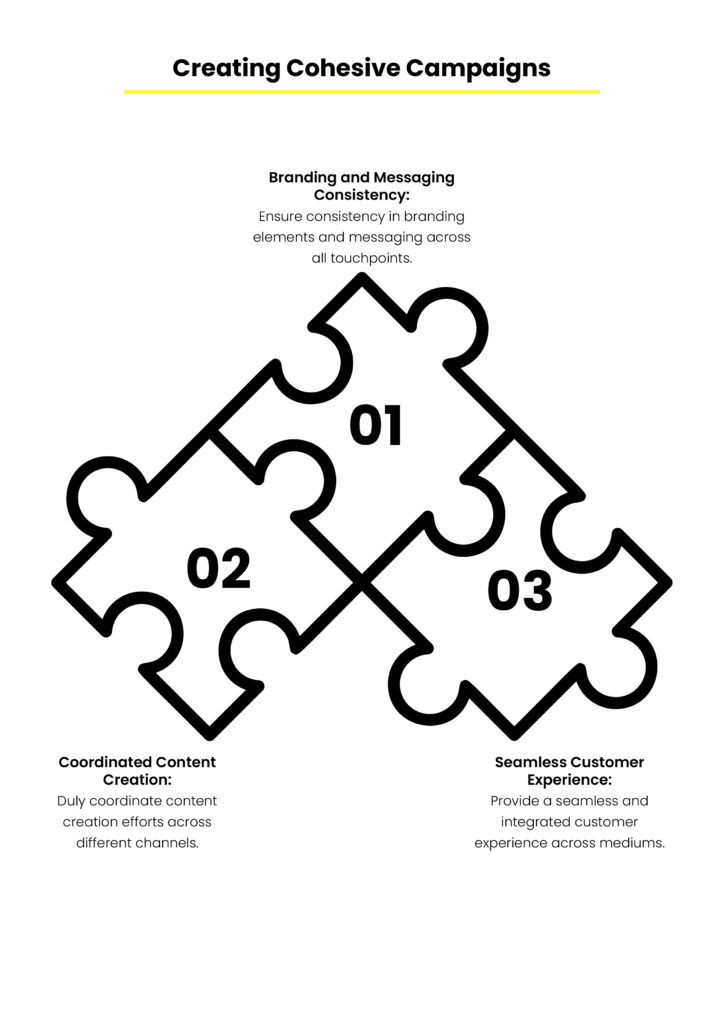Having an Integrated Marketing Communications (IMC) portfolio means that a one-off analyst can automatically pick a channel to gain clear foresight about your overall campaign strategy activities. This is truly the art of IMC since insights are gleaned readily, facilitating an understanding of your business’s standing.
IMC has evolved into a stepping stone where social media and creative mock-up criteria all converge to standard display, KPIs that truly measure and effective cross-channel communication to identify gaps in strategy deployment. IMC can catalyse better engagement, conversions and a solidified approach to delivering campaigns promptly and adeptly.
This blog will highlight how to leverage Integrated Marketing Communications effectively for maximum exposure, efficiency and to induce expansion of your audience base in the long term.
The Concept of IMC
Integrated Marketing Communications (IMC) involves strategically coordinating various communication channels and tools to deliver a consistent brand message. This includes advertising, public relations, direct marketing, sales promotion, and digital marketing. IMC campaigns aim to enhance brand awareness, foster customer engagement, and drive desired actions.
Channels in Integrated Campaigns
In integrated campaigns, leveraging a combination of traditional and digital channels is key to reaching and engaging target audiences effectively. By strategically utilising various channels, marketers can maximise brand visibility and ensure message consistency across different touchpoints.
- Traditional Media (TV, Radio, Print)
Traditional media channels like television, radio, and print publications continue to offer broad reach and brand visibility, making them integral components of integrated campaigns.
- Digital Media (Website, Social Media, Email)
Digital channels such as websites, social media platforms, and email marketing enable brands to engage with consumers on a more personal level and gather valuable insights into their preferences and behaviour.
Creating Cohesive Campaigns

Creating cohesive campaigns involves aligning branding and messaging across all marketing channels to ensure a consistent brand experience. By maintaining uniformity in content creation and delivery, businesses can reinforce their brand identity and enhance customer recognition and loyalty.
- Branding and Messaging Consistency
Ensuring consistency in branding elements and messaging across all touchpoints is crucial to reinforcing brand identity and fostering consumer trust and loyalty.
- Coordinated Content Creation
Coordinating content creation efforts across different channels helps maintain messaging coherence and alignment with overall campaign objectives, ensuring a seamless brand experience.
- Seamless Customer Experience
Providing a seamless and integrated customer experience across channels not only enhances brand perception but also strengthens customer relationships, leading to increased loyalty and advocacy.
Strategies for Integration
Effective integration strategies involve orchestrating cross-channel promotion and synergy to maximise campaign impact. By sharing and analysing data across different platforms, businesses can gain comprehensive insights into consumer behaviour and preferences, enabling more targeted and personalised marketing efforts.
- Cross-Channel Promotion and Synergy
Leveraging cross-channel promotion allows brands to amplify their message and reach a broader audience while reinforcing brand consistency and coherence.
- Data Sharing and Analysis
Sharing data between different channels enables marketers to gain insights into consumer behaviour and preferences, facilitating more targeted and effective campaigns.
- Campaign Planning and Coordination
Effective planning and coordination are essential for ensuring that all elements of an integrated campaign work together harmoniously to achieve the desired outcomes and maximise ROI.
Challenges and Solutions
Navigating challenges in Integrated Marketing Communications (IMC) involves overcoming obstacles like silos, budget constraints, and the need for agility. Solutions to these challenges often require collaboration, resource management, and adaptability to ensure the success of integrated campaigns.
- Overcoming Silos and Fragmentation
Breaking down organisational silos and fostering collaboration between different departments is crucial for successful integration and alignment of marketing efforts.
- Managing Budgets and Resources
Effective budget allocation and resource management are essential for optimising campaign performance and ensuring that resources are allocated to activities that drive the highest ROI.
- Maintaining Agility and Adaptability
Staying agile and adaptable enables brands to respond quickly to changing market conditions and consumer preferences, ensuring that integrated campaigns remain relevant and effective over time.
Future Trends in IMC
Future trends in Integrated Marketing Communications (IMC) are shaped by technological innovations, advancements in personalisation, and evolving consumer behaviours. These trends are driving the integration of new platforms, strategies, and approaches to meet the changing landscape of marketing communication.
- Technology Innovations Impacting Integration
Advancements in technology, including artificial intelligence and marketing automation, are poised to revolutionise how brands integrate their marketing efforts and engage with consumers across channels.
- Personalisation and Targeting Advancements
Advances in personalisation and targeting capabilities will enable brands to deliver highly relevant and tailored messages to individual consumers, enhancing the effectiveness of integrated marketing campaigns.
- Evolving Consumer Behavior and Preferences
Understanding evolving consumer behaviour and preferences will be essential for brands to adapt their integrated marketing strategies and stay ahead of the curve in a rapidly changing marketplace.
In conclusion, Integrated Marketing Communications (IMC) represents a holistic marketing approach that ensures consistency, coherence, and effectiveness across diverse channels and touchpoints. By embracing integration, collaboration, and data-driven decision-making, brands can create cohesive campaigns that resonate with their target audience and drive business success in an increasingly competitive landscape. So, always consider cross-channel and strategic integration for campaign success where you can get a headstart in modern marketing methods.
